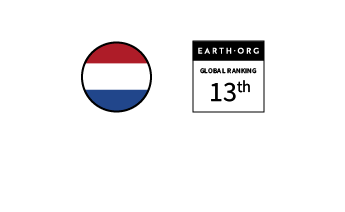Welcome to the Earth.Org Global Sustainability Index, where Earth.Org examines the policies and actions regarding the environment of every nation on earth. Combining the most respected global indexes on pollution, climate change, policy, energy, oceans, biodiversity we have produced an overall Global Index, which will be updated annually. This is the Global Sustainability Index scorecard for Iceland.
Iceland stands out among countries committed to the Paris Agreement by its unusual emissions profile. Nearly all heating and electricity generation comes from hydro and geothermal energy, and is thus renewable. It holds a large potential for carbon sequestration through revegetation and afforestation, along with reclaiming drained wetlands. The biggest greenhouse gas sources are industrial processes, transport, agriculture and waste management.
Countries are expected to renew their commitments in 2020, but the global COVID-19 pandemic has led to many postponing this. Iceland did not do so, submitting new goals for 2030 that could lead to a 40-46% reduction in emissions compared to 2005 levels. The plan consists of emissions reduction in key sectors, but also encourages climate-friendly changes in everyday life for its citizens, from waste management to transport.

- Iceland’s first NDC was improved upon this year, as the government renewed its commitments under the Paris Agreement. The new measures are expected to allow a 40-46% reduction in emissions by 2030 compared to 2005 levels.
- The country’s energy-generation profile is already very renewable-reliant, mostly coming from hydro and geothermal power.
- Most emission reductions will take place in the industry, transport and agriculture sectors.
* Our Climate Change Ranking considers this country’s efforts toward climate change insufficient and thus has not ranked it.
** Our Energy ranking considers emission intensity (units of energy per unit of GDP). When one or both are low enough to make their influence negligible on a global scale, the country is left out of the ranking.
Global Sustainability Main Page.
References:
-
Biodiversity, Policy: Sachs, J., Schmidt-Traub, G., Kroll, C., Lafortune, G., Fuller, G. (2019): Sustainable Development Report 2019. New York: Bertelsmann Stiftung and Sustainable Development Solutions Network (SDSN).
-
Oceans: Halpern, Benjamin S., et al. “An index to assess the health and benefits of the global ocean.” Nature 488.7413 (2012): 615-620.
-
Pollution: Wendling, Z. A., Emerson, J. W., Esty, D. C., Levy, M. A., de Sherbinin, A., et al. (2018). 2018 Environmental Performance Index. New Haven, CT: Yale Center for Environmental Law & Policy. https://epi.yale.edu/
-
Climate Change: Climate Change Performance Index; Jan Burck, Ursula Hagen, Niklas Höhne, Leonardo Nascimento, Christoph Bals, ISBN 978-3-943704-75-4, 2019
-
Energy: Enerdata –World Energy Statistics – Yearbook.
World Energy Statistics











